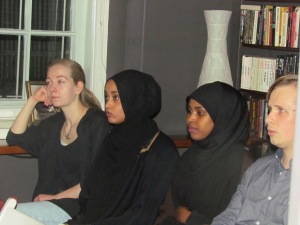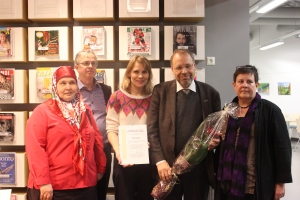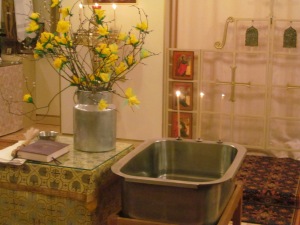There is an activity, started on October 2014, among concreate issues with young adults from different faiths and worldviews to encourage and equip young adults in Helsinki into dialogue and co operation in using digital technology and media.  There is news about this project in Finnish, published by the Church media Kirkko ja Kaupunki. You can read more about the Digital Storytelling used in interfaith education in the text complied by Heidi Rautionmaa. The topic of this writing is Interfaith Education finds fresh methods in digital technology. Some of this text was presented in international symposium entitled Women at the heart of the Monotheisms: a Plural history. The event was organized by the Centre for Women´s Studies in Islam affiliated to the Moroccan Ulama Rabita Mohammadia in Rabbat, Marocco on November 12 th – 13th, 2014, as part of the UN International Week of Science and Peace.
There is news about this project in Finnish, published by the Church media Kirkko ja Kaupunki. You can read more about the Digital Storytelling used in interfaith education in the text complied by Heidi Rautionmaa. The topic of this writing is Interfaith Education finds fresh methods in digital technology. Some of this text was presented in international symposium entitled Women at the heart of the Monotheisms: a Plural history. The event was organized by the Centre for Women´s Studies in Islam affiliated to the Moroccan Ulama Rabita Mohammadia in Rabbat, Marocco on November 12 th – 13th, 2014, as part of the UN International Week of Science and Peace.
Posted in Uncategorized | Tagged interfaith dialogue, interfaith education, interreligious dialogue, peace work, storytelling | Leave a Comment »
World Water Day is held annually on 22 March as a means of focusing attention on the importance of freshwater and advocating for the sustainable management of freshwater resources. In 2013, in reflection of the International Year of Water Cooperation. World Water Day is also dedicated to the theme of cooperation around water.
Water is an important symbolic and practical element of every faith. Water is therefore a key element in ceremonies and religious rites.
Topics such as privatization, industrial pollution and water rights are deeply moral issues effecting not only humanity, but all life on earth.
Interfaith Dialogoue Network in Finland consists of Faiths Without Borders/Uskot ilman rajoja ry., Religions for Peace Women of Faith Network in Finland, The Forum of Religions in Helsinki URI CC, Living together in cities/ Kaupunki yhteisönä ry. and Baabeli Netmagazine invites people and communities all around the world to bless water on World Water Day.
The growing interfaith and ecumenical movement, especially on the grass root is hope giving when responding today´s ethical crisis. The key principle underlying the Golden Rule is the unity and interconnectedness of all things. It is one of the cornerstones for dialogue and co operation in promoting more peaceful, just and sustainable global community.
In designating 2013 as the UN International Year of Water Cooperation, the UNGA recognizes that cooperation is essential to strike a balance between the different needs and priorities and share this precious resource equitably, using water as an instrument of peace. Promoting water cooperation implies an interdisciplinary approach bringing in cultural, educational and scientific factors, as well as religious, ethical, social, political, legal, institutional and economic dimensions.
Posted in Uncategorized | Leave a Comment »
 He has greatly contributed four decades to create culture of peace, in promoting dialogue and values of new humanism. Tapio Varis has served as UNESCO Chair in global e-learning with applications to multiple domains.
He has greatly contributed four decades to create culture of peace, in promoting dialogue and values of new humanism. Tapio Varis has served as UNESCO Chair in global e-learning with applications to multiple domains.Posted in Uncategorized | Leave a Comment »
 URI CONSIDERS ETHICS OF WATER AT UN CONFERENCE
URI CONSIDERS ETHICS OF WATER AT UN CONFERENCE
Rio+20 Event Considers Spiritual Aspects of Sustainability
San Francisco, CA June 5, 2012 – Water – and its capacity to sustain both physical and spiritual life – will be the topic of a special presentation by members of URI (United Religions Initiative), the world’s largest grassroots interfaith organization, at Rio+20, the upcoming United Nations conference on sustainable development.
Professor of Religious Education Reijo E. Heinonen will lead the list of panelists presenting “The Spirituality of Ethics and Water” at 9:30 a.m. June 18, 2012 at the RioCentro convention center in Rio de Janeiro, Brazil.
Through dialogue and cooperation, members of different faith traditions can avoid competing with or de-humanizing “the other,” and can learn to share the world’s shrinking resources.
“Have you ever thought how the understanding of the intrinsic value of water could contribute to our use of water and our prodigality?” said Dr. Heinonen, founding dean of the ecumenical theology faculty of the University of Joensuu in Finland. “Spirituality, with its holistic, religious dimensions can promote the understanding of the intrinsic value of water — which can hinder its prodigal use.”
His discussion will be followed by a series of presentations by practitioners of several world religions, spiritual traditions and indigenous beliefs who will describe the essential meaning of water – a symbolic and practical element of every faith – in their traditions.
The event will end with a closing spiritual ritual and a blessing over water samples brought from many different parts of the world.
“We need spiritual literacy,” said Heidi Rautionmaa, a Trustee-Elect of the URI Global Council. “Spirituality refers to an inner path enabling a person to discover the deepest values and meanings by which people live. Sustainable behavior and action are based on holistic spirituality and ethics.”
URI will present the event together with URI Brasil, URI Finland, Faiths Without Borders – a URI interfaith group based in Finland promoting a sustainable lifestyle and global ethic – and in collaboration with the Ecumenical Water Network, a group of churches and Christian organizations promoting access to water throughout the world coordinated by the World Council of Churches.
To schedule an interview with URI Associate Executive Director Debra Bernstein, please contact PR Coordinator Rob Rogers.
#####
About URI:
URI is a global grassroots interfaith network that cultivates peace and justice by engaging people to bridge religious and cultural differences and work together for the good of their communities and the world. We implement our mission through local and global initiatives that build the capacity of our nearly 550 member groups and organizations in 80 countries to engage in community action such as conflict resolution and reconciliation, environmental sustainability, education, women’s and youth programs, and advocacy for human rights. With headquarters in San Francisco, the network is led by Executive Director Charles Gibbs, President William E. Swing and Yoland Trevino, chair of an elected 23-member Global Council of Trustees from 19 countries.
Visit www.uri.org for further information on URI’s projects in:
Africa
Asia
Europe
Latin America and the Caribbean
Middle East and North Africa
Southeast Asia and the Pacific
North America
About EWN:
The Ecumenical Water Network is an international network of churches and Christian organizations promoting the preservation, responsible management and the equitable distribution of water for all, based on the understanding that water is a gift of God and a fundamental human right. The Secretariat of the Ecumenical Water Network is located at the World Council of Churches in Geneva.
Visit http://water.oikoumene.org for more information about EWN.
Posted in Uncategorized | Leave a Comment »
